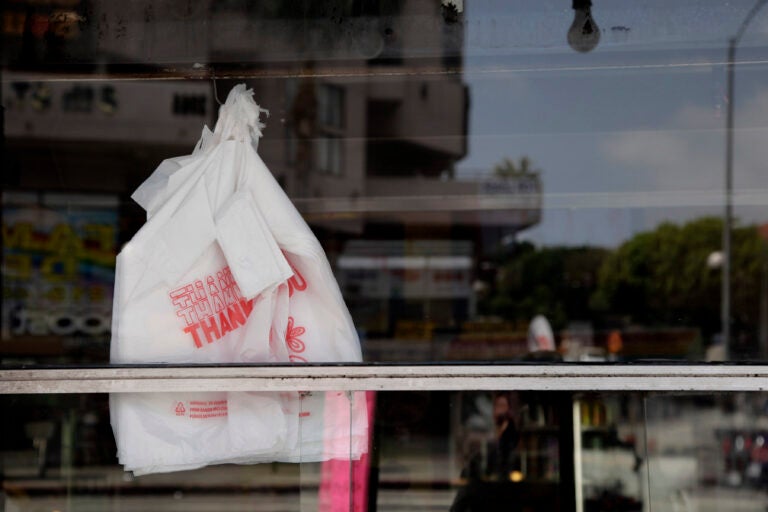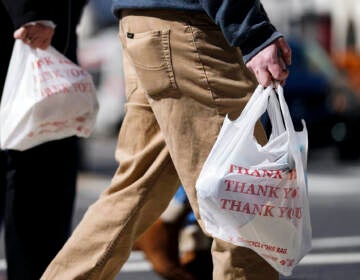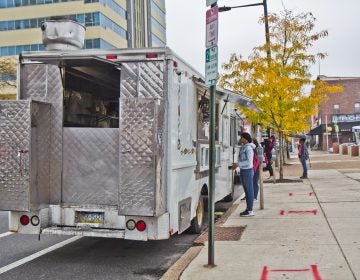Grocery stores remind customers to ‘Plan for the Ban’ as Del. moves to reusable bags
A ban on single-use plastic bags takes effect in 2021. Stores can sell reusable bags, or provide paper bags at no cost or a cost of their choice.

Starting July 1st, businesses will be required to post informal signage alerting customers that the City's plastic bag ban will go into full effect in October. (AP Photo/Jae C. Hong, File)
Delaware shoppers will ditch plastic bags in favor of reusable ones in the new year, as restrictions on single-use bags for groceries and other purchases goes into effect in an effort to protect sea animals, wildlife and humans.
The new law bans plastic bags from stores with more than 7,000 square feet of retail space and chain stores with three or more locations of at least 3,000 square feet each. Stores will be able to sell reusable bags or provide paper bags at no cost or a cost of their choosing.
Plastic bag bans have been enacted in seven other states, and several major cities have similar laws.
“It will have a significant impact on the waste and discarded tonnage, but also it will have longer-term psychological and awareness effects. This is part of our long-term goal to consciously be more environmentally friendly and more aware of different practices to minimize the negative impacts on the environment, and hopefully promote positive change,” said the sponsor of the legislation, State Rep. Gerald Brady, D-Wilmington.
“This effort is an indication of the consciousness we as legislators have, but we’re responding to, quite frankly, the interest and the aspirations of our constituents that would also like to see, not tougher laws so to speak, but a more conscious involvement in addressing the things that negatively impact our environment.”
Large retail stores in Delaware currently are required to have recycling receptacles on site, so customers can dispose of their plastic bags responsibly. But it’s not clear how often customers take advantage of those recycling bins.
Plastic bag litter remains a problem. Last year, volunteers collected 2,172 plastic bags during the state’s annual Coastal Cleanup Day.
“It doesn’t take a scientist to see them all over the environment, hanging in trees, on the roadside, in our waterways, in the ocean, on our beaches. We know they are a blight in our communities. So we certainly hope that will be diminished by this new law,” said Plastic-Free Delaware founder Dee Durham.
“There are other impacts as well to wildlife, and even domestic farm animals that get the bags in their feet, or they are wrapped around their bodies, so there are animal deaths associated with these bags and we hope that will be diminished with this law. There’s also health impacts that have been proven, as the plastic breaks down and ends up in our own food chain. That’s something that’s becoming more and more studied, and it’s proven we’re beginning to eat plastic in various ways and the health impacts are not good.”
Stores that violate the new law will face civil liability or administrative penalty up to $500 for the first violation, up to $1,000 for the second violation, and up to $2,000 for the third and each subsequent violation.
The law makes exceptions for bags used to wrap meat, fish, flowers or potted plants, or those that contain unwrapped food items. Bags containing live animals and those that transport chemical pesticides or cover articles of clothing on hangers also are exempt.
The legislation also leaves municipalities with more than 50,000 residents the option of enacting stricter laws to require stores in excess of 500 square feet to comply with the ban.
A spokesman for ShopRite said customers can purchase a variety of reusable totes in its stores, as well as a thicker 10-cent reusable plastic bag at checkout. He said they can hold more groceries than single-use bags, can be used multiple times, and can be cleaned with disinfectant cloths.
ShopRite is reminding customers about the new law with store signs, and on Facebook with messages that encourage people to “Plan for the Ban” by bringing their reusable bags to shop.
“ShopRite is committed to sustainability, and we encourage all our customers to ‘be the change’ and bring their own reusable bags to the store each time they grocery shop. Starting Jan. 1, when the new law goes into effect, all ShopRite stores in Delaware will discontinue the distribution of single-use plastic bags at checkout,” the spokesman said in an email.
Durham said that once Delaware shoppers get used to the change, they won’t look back.
“Once you buy your first one or two or three reusable bags, you just have to teach yourself to remember them,” she said with a laugh. “And it becomes a habit, and then you’ll wonder why you didn’t start using them before, because they’re usually stronger and hold more and last longer.”
The biggest concern Durham said she hears is that people are reliant on plastic bags for walking their dog or for their trash cans at home.
“Plastic bags aren’t free, you’re paying for them one way or another, even if it’s hidden in the cost of your groceries, and also taxpayers having to pay for governments to keep streets clean and keep drainages clean,” she said. “So what I suggest for walking your dog is you can buy doggy duty bags by the hundred at pet stores or grocery stores, you can also use your newspaper bags, or reuse old ziplocks you’re done with. Generally, people have other sources of plastic bags to use; if not, you can buy them fairly cheaply.”

Get daily updates from WHYY News!
WHYY is your source for fact-based, in-depth journalism and information. As a nonprofit organization, we rely on financial support from readers like you. Please give today.






